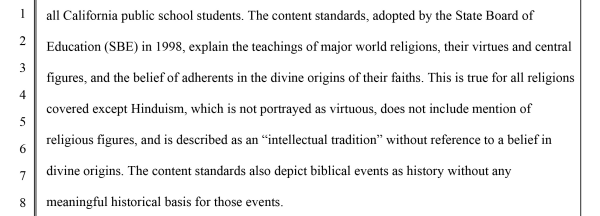The lawsuit, filed by California Parents for the Equalization of Educational Materials (CAPEEM) and several parents, alleges that the state’s history-social science standards for kindergarten through 12th grade negatively portray Hinduism — such as emphasizing its ties to the caste system — while endorsing the positive aspects of other religions, including Islam, Christianity, and Judaism. The non-profit group says this is unconstitutional and violates the Fourteenth Amendment.
Also Read: California Lt Governor Gavin Newsom, top academicians seek fair portrayal of Hinduism in text books in US
“When you teach something so negative like that, and you don’t teach negative things about interpretations of other faiths, that’s a pretty big problem,” Glenn Katon, the civil rights lawyer who filed the suit on behalf of CAPEEM, told NBC News.
Whether the caste system is a social construct or endemic to the Hindu religion is a topic of ongoing debate.
Katon says the issue is one of equity and representing the controversial aspects of all religions in the curriculum. “If across the board, students were taught, ‘Well, Christianity was used to defend slavery, and some Christians still believe that same-sex relationships are immoral, and some Hindus believe that caste is part of their religion,’ [it would be more equitable],” he said. “I’m not recommending that that would be a good way to teach public school students, but at least that would be equal treatment.”
The complaint also takes issue with Hinduism being depicted as an “intellectual tradition” rather than as a religion and its scriptures as “literature” rather than as religious texts with roots in the divine. This is in contrast to parts of Jewish religious doctrine which plaintiffs claim are represented as historical events when “In fact, historians do not consider the Exodus an historical event,” the suit says.
“We believe that Hindu children deserve to be treated with dignity in their classrooms. That’s the reason we have [filed this lawsuit]. We see no other option,” Arvind Kumar, a member of CAPEEM’s board of directors and a co-founder of the organization, told NBC News.
Representatives for the state’s Department of Education said they could not comment on pending litigation.
But the department’s communications director, Bill Ainsworth, told NBC News, “The history-social science framework is providing the latest, most accurate information to our students about history, social science and civics. The framework, which was produced after an extensive public comment period, treats all religions and ethnic groups fairly.”
The state’s history curriculum was the subject of heated debate within the South Asian-American community last spring, as opposing groups debated the use of terms like “ancient India” versus “South Asia,” Hinduism’s ties to the caste system and the inclusion of the sub-continent’s minority groups and religions.
Last July, the State Board of Education adopted changes to the curricular framework, which serves as an instructional guideline for California’s school districts. Hindu-American groups declared victory when the Board decided to not change the use of “ancient India” to “South Asia” in certain parts of the framework.
In 2006, CAPEEM filed a lawsuit against the state over portrayals of Hinduism in California textbooks. The group settled in 2009.
Kumar says that this latest fight is a continuation of last year’s and that Hindu-American students will suffer discrimination as a result of the curriculum.
“There’s going to be plenty of opportunities for students to hear about the negative interpretations and things that society judges minority faiths on,” said Katon. “They don’t need to get that in the classroom.”






0 Comments